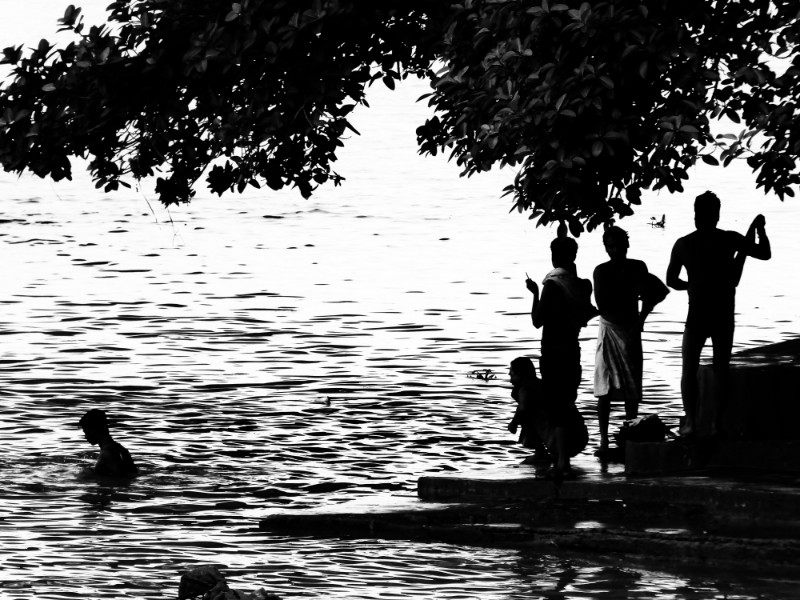Mirages: A walk along the periphery
/By Julia Bennett:
mirage noun 1. an optical illusion caused by atmospheric conditions
Air still, heat building during the morning in the summer of 2018. Purple marshes to the right, tinged with sea lavender, to the left the creeks and sandbanks of the interstitial area between land and sea. Stepping out eastwards from Burnham Deepdale, the North Norfolk coast path crosses Deepdale Marsh on a high raised bank. Upturned boats seemingly abandoned to the mud and gulls; a windmill in the distance, unmoving. A sense of desolation averted by the Mediterranean-like heat. A group of paddle boarders drift past: serenely balanced on their boards in the still waters of the English coastal creeks, but clearly not fit craft for the rigours of the North Sea crossing itself. This is the not-quite-land and not-quite-sea border of the rump of England, back turned towards mainland Europe out across the North Sea.
The path itself, built up above the tides, steers a tenuous path between the opposing forces of land and water. The local population of sea birds is well adapted to the equivocal nature of this place: long-legged orange-beaked oyster catchers; a lively assortment of gulls; mousy-brown curlews, elongated toes splayed over the surface, long bills digging deep into the salty mud. Passport-less, curlews travel across Europe. Some stay in the UK over winter, others choosing France or Spain, like elderly British holiday makers spending a few months somewhere warm to save on heating bills. A slight ripple in the creek signals the presence of those bilingual, multi-modal, land-and-marine mammals: an otter, bobbing a furry head briefly above the water. For millennia the North Sea has provided a pathway to the rest of the world, rather than a moat around the castle of England.
Hitting the road at Burnham Overy Staithe the mood changes: the harbour bustles with tourists, boats clamouring for their custom. Zig-zagging through the crowds, the coast path steps out again onto a high bank, this time crowded with people headed to the beaches at Holkam Nature Reserve. Creeks and channels curl into the spit of land like tree roots digging into a rock face, refusing to give way to the clarity of either land or sea. Dunes ahead obscure the view of the beach whilst simultaneously signalling its sandy closeness. Over the dune-summit the land finally concedes defeat and in a long exhalation of breath sends a broad expanse of blue to meet the horizon. Golden sands stretch eastwards as far as the eye can see, a broad yellow-highlighter mark on the map demarcating the island of Great Britain from the continental mainland. Walking now along the shoreline footprints stamp out tribal belongings, temporary tattoos washed away by the next wave. The hot, still land seems to hold its breath and wait. Gradually, Holkam beach broadens out as the land of this corner of England distinguishes itself from the polyglot North/Nord Sea/see/zee. No longer a liminal space between land and sea, mainland and island, the ground underfoot becomes a little firmer and the atmosphere changes.
mirage noun 1.1. An unrealistic hope or wish that cannot be achieved
A couple of miles along, dunes rise again and behind them, a cool, sweet smelling pine wood reminiscent of the beaches of Northern France. The cool silence of the deserted sand-and-pine-needles paths sheltering beneath the trees provides a breathing space away from the spotlight of the hot midday sun. Through the trees, glimpses of colourful painted beach huts presage the arrival of the superior-but-faded grandeur of Wells-next-the-sea. In bright blocks of colour or Breton stripes beach huts are a staple of the traditional British seaside, along with buckets and spades and sticks of rock. But unlike the cheap plastic buckets on sale they are highly desired properties, costing almost a day’s wages to rent for the day, despite being, literally, built on sand.
Emerging from the trees the path skirts a large car park before following the sea wall into Wells-next-the-sea, ironically another mile inland due to the retreat of the sea over the centuries. A mini-train transports those without cars to and from the beach. The sea’s retreat changed the identity of this place. Wells was a busy trading port with Europe in the sixteenth century but is now a slightly upmarket, English seaside town with fish and chips and tacky souvenir shops along the front and a few olde gifte shoppes in the narrow roads heading inland.
The coastal bus service passes through here. It is full of school children at 4 o’clock on a term-time weekday afternoon, with a few tourists and the occasional local. Along this gentrified stretch of coast, the bus travels through picture-postcard villages: red-tiled rooves and Georgian facades, roses around the doors of stone cottages, traditional butchers’ and greengrocers’ shops with names written in antiquated fonts, and the ever-present bunting, flapping gently in the breeze. At first glance this is an image of a corner of England which, much like Wells, has been left high and dry by the twenty-first century. A Disneyfied mirage, hazy in the late-afternoon heat. Isn’t that a ‘Jack Wills’ nestling amongst the tea shops of Burnham Market?
***
Note: Definitions taken from en.oxforddictionaries.com
Julia Bennett is a sociologist who researches place and belonging













